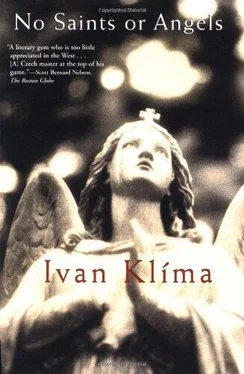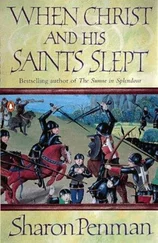At that time Aunt Venda still occupied a little room in the cottage. She had long, unkempt grey hair. She spent the whole time sewing away pn a Minerva treadle sewing machine. She wasn't allowed to smoke, because she couldn't be trusted with matches. She used to make up for it by drinking beer from first thing in the morning. It seemed to me that my aunt never left her room; Grannie would bring her beer and food. When I visited Auntie, she'd smile at me, displaying her crooked yellowy incisors, and say something I usually couldn't make out. But I did manage to understand that she couldn't go outside because she was just a receptacle, a vessel in which a fire was constantly smouldering. All it needed was a slight breeze or for the sun to shine on her, and she would burst into flame. It would happen anyway one day.
And doesn't the fire burn you, Auntie? I would ask her.
Oh it does, sweetheart. It gives me a terrible pain here, she'd say, indicating her breasts, neck and head.
And then one day it really did happen. I was playing out in the yard when the door of Auntie's room suddenly burst open unexpectedly and in the door frame there appeared a flaming figure
that started to run towards me. For a moment I couldn't understand anything and had the feeling that a fairytale apparition was coming to get me, but then I recognized my aunt.
'I'm burning,' she shouted. 'I set myself alight!'
Her clothes were on fire and it seemed to me that smoke was coming out of her head. Terror rooted me to the spot as I watched the approach of that fiery vision. Then Auntie started to scream horribly and cry for help, and I ran away. Grannie rushed out of the house and when she saw what was happening, she snatched a sack that was hanging from a beam by the door and dashed over to Auntie with it.
She managed to douse the flames, but she couldn't save my aunt. They took her to hospital, where she died a few days later. I wanted to go and visit her, but they told me I couldn't any more because Auntie was gone. She was gone because she didn't want to be here any more. Auntie had burnt up and was gone and I cried.
That was my first encounter with death, and it was a haunting experience. That image of a burning figure has never left my memory, even though I have seen lots of other frightful pictures and photos of famine, murders and wars — there have been so many of them since then that I can hardly keep count, and apparently one soldier in five was still a child.
I've noticed that almost everyone I know was marked by at least one such shocking experience in their childhood. My husband's best friend froze to death in the mountains. When Lida was small, two cars crashed in front of her eyes and they had to cut the dead out of the wreckage with oxyacetylene torches. Not to mention Mum. Admittedly she didn't see what happened to her mother and her aunts and cousins, but the thought of what was done to them must have marked her for life.
While I was still at Lipová that time I started to wonder about the strange phenomenon that one moment someone could be there and the very next they could be gone, and it seemed to me
so sad that everything, absolutely everything, had to come to an end, including me. There was no escape. Death was the supreme ruler, and if he called you, you had to go and you never came back.
It was odd that they depicted that ruler as an old woman or a skeleton with a scythe.
But Grannie consoled me and sang me a song about death, from which I understood that death wasn't wicked. It wasn't a skeleton or even an old woman, it was a little girl like me. I can still recall the words of that song, though I don't sing it any more:
There once was an old woman And she had just one son. And he lay sick and dying For cool water he was crying. There was no one to go to the well So his old mother she went herself. On the way she met a young child A messenger from God so mild. I'm coming to fetch his dear soul To Paradise, his heavenly home.
From that I understood that death wasn't a stranger who comes between two people. A little girl or a little boy was sent by someone to carry the soul up to heaven, where life was more beautiful than on earth.
I didn't know what a soul was — I'd only heard of the sole of a shoe. When I asked them, they couldn't explain it.
When I was at Grannie's I could run around outside with the children, but quite often something would get into me and I wouldn't feel like seeing anyone. Behind the cottage in the far corner of the garden by the fence there grew an enormous walnut tree with a hollow trunk. There was just enough room for someone my size. I'd find refuge there in my own little house, where
I'd spend hours on end. What did I do there? I can't remember. I used to take my rag doll — my sister — along with me and a teddy bear. He was actually my first husband, though I don't count him any more. He was utterly reliable and had big, brown glass eyes. We'd all crouch down in that little cave full of the scent of wood and resin. Mist ahead of us, mist behind us. I would draw it like a curtain. No one could see us or hear us, only we could hear the horse whinnying in the stable and the ducks quacking in the yard.
One day after lunch they took the horse off to the slaughterhouse, the ducks had their throats slit, the doctor banned Grannie from smoking, we ate shop-bought noodles and the walnut tree breathed its last, falling asleep from old age. What happened to my teddy-bear husband? He disappeared somewhere. He's not here any more. That's the way it is with husbands: the day comes when they disappear and they're not around any more.
I light a cigarette. The first time I smoked I was two years younger than my daughter is now. I committed the crime in the little park just behind the school. I was seen, of course — by my civic studies teacher, a wrinkled old maid. She immediately denounced me to Dad. He gave me a hiding, walloping me until I perjured myself by swearing that that was the last time, that I'd never smoke again. But at that very moment I vowed to myself that I would smoke, drink and go out with boys just to spite him. Even if he beat me black and blue. I'd just be more careful and more cunning. What sort of an attitude is that, what sort of a temperament: being certain I know the truth and therefore have the right to judge others, take decisions for them, and ban anything I object to and don't agree with? That was how he tried to subjugate me, that's how he and his ilk tried to enslave the whole of mankind. Without people like that, no tyrant would manage to rule for even a minute. Anyway I didn't manage to stand up to him the way my mother had stood up to her father. I didn't leave home as a way of showing my contempt for everything he stood
for. All I managed to do was to harm myself and assert my right to harm myself irreparably if I felt like it.
Mum managed to stand up to her father, but it's as if that entirely exhausted any rebelliousness in her and she was no longer capable of standing up to her own husband. She even put up with his slaps round the face. Well, I did manage to stand up to my husband and his infidelity, for all the good it did me.
I know I won't get to sleep. By my bed there's a book that I've started reading and under it a few magazines, but instead I get up and open the door to the bedroom where my daughter lies sound asleep. She is uncovered and her nightdress has ridden up so that she lies there almost naked. She's not a little girl any more, she's a woman. Her bottom has broadened and her thighs have fattened; I'll have to keep an eye on what she eats: what liquids and solids she ingests, what she smokes and where she goes when she's out. All the care I've taken to stop her eating sugary things and whenever I gave in and let her have something, she had to brush her teeth straightaway. I've kept an eye on her teeth and she's totally free of caries, but what about the parts that aren't visible when you open your mouth to speak or smile?
Читать дальше












